Grocery Shopping in Merida
Shopping for groceries in Merida, even after four years, is not the mindless but somehow comforting activity we used to take for granted back in California.
As the Mexican economy has improved and Mexican corporations have begun to join the 21st Century, grocery shopping in Merida has gotten easier and less strange.
Note we said "less" strange... but not NOT strange.
First of all, there's the all important choice of where to shop. For some reason, there is no one place that has everything we need on a regular basis. If we weren't fond of some of the foods that we grew up with and now feel we would rather not do without, we might be able to get by with the more local choices for grocery shopping: the downtown mercado (market), the neighborhood mercados, the ISSTEY, or the corner tendejones.
Mercados, Tendejones, Oh My!
The downtown mercado has great fresh local vegetables and fruits, as well as all sorts of exotic things made and grown locally, and a wide assortment of things everyone needs like socks, underwear, shoes, birds, pirated CDs, hammock hooks, flowers, huipiles, votive candles, pig heads and Christmas lights. It's incredibly picturesque, alternately charming and squalid. The problem with shopping in the mercado is we mostly want to whip out our cameras all the time, and very little shopping gets done.
And we can't find black tea or cinnamon Pop Tarts in the mercado to save our souls. On top of that, each neighborhood market is different. Our local mercado in Parque Santa Ana is good for fresh vegetables and fruit in season. Fresh squeezed jugo de naranja and toronja (orange and grapefruit juice) is cheap there, and for a quick panucho or a plate of cochinita pibil, it's the perfect place. But again, no Pop Tarts. And we wouldn't shop there for meat. Meat is there, out on the counter, but we just can't bring ourselves to buy it there.
Let's get something straight. We really don't eat *that* many Pop Tarts... consider "Pop Tarts" a literary device, a metaphor, to indicate any number of things that we want to buy that were widely available back in the States, but not here. As time goes on, the list of these products is less and less, or we care about them less and less... but there's always something!
Another shopping option is ISSTEY, the government-subsidized grocery store that is on Calle 60 at Calle 49. It's a great place to buy packaged goods manufactured in Mexico (mostly) and the USA. We can buy Ritz crackers, hot dogs, rice or toilet paper at ISSTEY, but no fresh fruits or vegetables. And, you guessed it, no Pop Tarts. If we're in the office whipping up a quick lunch and suddenly realize we don't have any mustard, or perhaps the hidden stash of potato chips has been invaded by marauding ants, then we dash down to the corner tendejon. In the States, long before 7-11 convenience stores, there were little mom and pop grocery stores. Remember those? They sold a variety of things you need just to get through the day, like mustard and potato chips and ice and aspirin and votive candles and little bags of colored balloons. Those stores still exist here in Merida. There's one on every corner, or so it seems. The tendejon near our office really outdoes itself by offering over 20 flavors of potato chips, along with freshly made salbutes and tortas. You can also get every kind of soft drink you might want, as long as you might want a Coke. Increasingly, the food offered at these stores seems designed to add to the increasing obesity problem, a sad development. We like the stores that still sell fresh food and some fresh vegetables or fruits, and we try to frequent them when we can.
Grocery Stores
So, that brings us to the next tier of grocery store choices, which we organize into three categories: Mexican chains, multi-national chains and bulk-item chains. The Mexican chains that have stores in Merida are Chedraui, Soriana, MEGA (Commercial Mexicana), Superama (owned by Walmart) and Bodega Aurrera, a Mexican-flavored lower-income version of WalMart (also owned by WalMart). Each have multiple locations here and all seem to follow the same model, which is similar to the WalMart here. Each store has groceries, a pharmacy, clothing, toys, a garden section, a hardware section... y tanto mas! Um, a word about Superama... it really is in a class by itself. Though owned by WalMart, it does its best to be the most upscale grocery store in Merida. It's located in the North, naturally (on the way to Gran Plaza on the right... you can't miss it). It feels the most like a US grocery store. And it has higher prices. Sometimes it even has better merchandise... but honestly, not often enough that we shop there all the time.
Of the three Mexican chains, we have come to prefer the newly-opened and architecturally-challenged, garishly- orange MEGA store. While we decry the way the store looks (those big orange letters give new meaning to the term "eyesore"), we love the fresh-baked bread, the occasional foreign foods (at Christmas we found our favorite Dutch cookies there!) and the extensive meat and vegetable departments. We can buy most of what we need there on a weekly basis, though not all, and sometimes we even find an item of clothing we like there. Yes, we shop for clothes at Mega sometimes... now you know one of our dirty little secrets. Other local grocery store chains include Soriana, Chedraui, Bodega Aurrera (owned by WalMart) and Superama. Superama probably deserves a mention. It is an upscale grocery store that is also owned by WalMart. At this writing, there is only one in Merida, on Prolongación Paseo Montejo in the north (before you get to Gran Plaza, on the right, parking underneath). You can find gourmet items at Superama that you won't find at other grocery stores here. You can find more expensive cuts of beef, better cookies, cheeses, breads and organic vegetables. You will pay for the privilege, but sometimes what you are looking for is at Superama.
If you want to shop for groceries at a multi-national chain store, you have one choice: WalMart (photo above). Suffice it to say, WalMart has Pop Tarts. We cringe as we shop there, hating ourselves for supporting the cheap-labor-exploiting, local-culture-destroying, domineering corporate monster that WalMart is. But sometimes, it's the only place to find really important stuff, like... you know. (And to be fair, WalMart is a better neighbor and employer here than in the States. No credit due WalMart. It's Mexican law that makes them that way.) The most popular (with expats) Merida WalMart is located at the busy intersection of Paseo de Montejo and Avenida Colon, across from the Hotel Fiesta Americana. It opens early (7 AM) and stays open late (until 11 PM). It doesn't seem to close for holidays either. There are more WalMarts around Merida... at last count, we think there are three. One in City Center to the East and one just past Plaza Dorada to the West, and probably one has been built since you started reading this article.
A Tip about Tips
Before we go on, and while we are on the subject of employee relations, a word about propinas (tips). In your grocery shopping experience, you will regularly come across two kinds of service people that expect and deserve (usually) a tip. The first is the young man or woman who bags your groceries. In most stores, the grocery baggers are students, some of whom seem very young, but all of whom probably really value this opportunity to contribute to their family income. On rare occasions (and only if you ask) the baggers will actually bring your bags out to your car for you. But most people just let them bag the groceries and tip them a few pesos for the service (we usually tip 5 pesos or more if they did a good job). One of the things we love about Mega is that they also employ senior citizens as grocery baggers. Those seniors have carried a bag or two in their time and they tend to bag more carefully and thoughtfully. We always tip them at least 10 pesos. The second kind of service you will need (even though you wonder why you never needed it before) is the man who picks you up in the parking lot, pushes your cart to your car, unloads your groceries into the car and then navigates you out of your parking space and on your way. We must admit to feeling put upon by these (mostly older) men sometimes. But we pay 5 pesos usually for being waited upon as if feminism had never happened. And in all fairness, these men need to earn a living and there are probably plenty of people that love having their groceries carried out and unloaded for them. We find it rather unnecessary most of the time, but when we've done a lot of shopping at Costco or bought large and unwieldy items, those men do come in handy.
Big Chain Stores That Are Not WalMart
The bulk-item chains here are Costco and Sams Club. Sams Club is on Prolongación de Paseo Montejo, on the left before you get to Gran Plaza. Costco is on Avenida Tecnológico, which is Calle 60, only more north. They are both pretty easy to find. And once you are inside, you have to pinch yourself to remember you are in Mexico. A lot of things are missing that would be in Costco or Sams Club in the States, but they come pretty close.
Wal Mart and Costco are the only stores that have fresh milk. Sometimes we are able to buy milk from the traveling milk man who drives a little cart that goes "Moo!" (photo at right). His milk is fresh and pasteurized, produced by a local hacienda south of Merida. It used to be that Wal Mart and Mega were the only places that regularly carry organic boxed milk, but Superama at least also does now too, and now we can't always find it at Mega. WalMart and Superama have a growing contingent of organic fruit and vegetables. Wal Mart, Superama and Mega have the cat food our cats like (Friskies canned salmon), but Mega now carries it more often than not and has the special cut of meat (complete with marrow bone) that we buy for our dogs, URL and Mali. In fact, we asked for bones so often, Mega now usually has them packaged and on the shelf. Mega has butter from New Zealand and Denmark, and has even started to carry balsamic vinegar and English Breakfast tea in their special foreign foods section. And just when you think you have it all figured out, our favorite place to buy steaks has become the Covi liquor store (it's from Argentina... the steak, not the liquor store).
Farmer's Markets
Do you miss those farmer's markets back home? And organic produce? Aside from the local mercados, which are essentially always farmer's markets, you might want to try the Slow Food Market, held on Saturdays on Avenida Reforma on the northwest corner of Avenida Colón. Here you will find vendors selling things like organic vegetables, honey, home-made Korean and Peruvian dishes, cupcakes, organically-raised chicken and fresh bread. This Saturday market has become very popular with many expatriates and locals alike, and has become a time to shop and visit with friends for many of us. The Slow Food Market is part of the global Slow Food movement and you can join the local Merida chapter to be a part of this increasingly-popular event. If you want to know more about it, call 999-913-8674 for more information in English or Spanish. If you are a fan of organic foodstuffs, you might also want to try the lovely (and tiny) natural foods store on the Prolongación de Paseo de Montejo (just south of the Office Depot corner) called Ya’axtal Eco-tienda y Café.
Got Milk? Uh... Not Really
Speaking of milk, when we first moved here, shopping for groceries at WalMart was strange in itself. WalMarts with groceries hadn't come to our town yet. We got over that easily... but then there was the milk issue. Some of us drink milk every day... and every other time we went grocery shopping, there was no fresh milk at WalMart. No fresh milk! How can that be? Fresh milk at the grocery store is just... well, a given. Its like air or something. Years later, we still cannot count on fresh milk at WalMart, but now we have the milk man with the truck that goes "Moo!", or we have boxed milk. Boxed milk has a slightly different taste, but it stays fresh a lot longer, we can buy it anywhere and those boxes fit in the refrigerator better. And frankly, now we're used to boxed milk and don't care as much about fresh milk. When in Rome...
Mayans apparently don't get along well with milk, so milk is not a priority for them. But yogurt... that's another story. Every grocery store in Merida sports an amazingly long and well-stocked yogurt aisle. Not a section, an entire aisle. There are more kinds of yogurt and liquid yogurt and yogurt flan and yogurt with granola and yogurt with nuts... you get the idea. Yogurt is big here. And while the yogurt in the grocery store isn't appreciably different from yogurt in the grocery store back home (thank you, globalization), we've had delicious fresh homemade yogurt in restaurants around the Peninsula. One word of caution: if you like plain yogurt, check the ingredients. Most yogurt sold as "plain" here in Mexico has sugar in it.
Bakery Etiquette
In the bakery section of most grocery stores, there is a large selection of breads and pastries. All the offerings are laid out on open air shelves for maximum exposure. You, the shopper, are expected to go to the bakery's central counter and pick up a large round silver platter and a pair of tongs. Balancing your plate in one hand while you push your cart around, you pick out the baked goods that you want and bring them back to the counter, where they are bagged and weighed and returned to you, ready to pay for at checkout. The variety of baked goods is quite astounding. WalMart, Chedraui, Soriana and Mega all have their own bakeries, so everything is fresh. They don't seem to bake with preservatives here (that's a good thing) so bread goes stale quickly. We've learned to buy just what we need for a few days.
Fruits and Vegetables
The same is true, by the way, of fruits and vegetables. (We have read that fresh fruits and veggies in supermarkets back home are for the most part "radiated for freshness" i.e. exposed to radiation so that they don't rot as quickly. The jury is out on whether this is good for humans or not). Fruit and vegetables go bad faster here as well. Partly, we think it's the climate. But even in the big grocery stores, we think they don't "radiate for freshness" here. (2009 update... sadly or not, we aren't sure, this isn't as universally true anymore. Some fruits and veggies are looking just like the ones in the States and lasting just as long. The locally eaten and Mexican-grown ones, not so much.)
Fruits and vegetables in the mercados are actually available based on the season in which they are grown, just like in the "olden days" in the US. They don't have mangos all year round... only when they are in season. But when they have them, they're locally-grown and delicious!
The fruits and vegetables are increasingly fresh and available all year long in the grocery stores (unlike when we moved here). When we first moved here in 2001, we had a hard time finding good lettuce, and celery was sold by the stalk, but only occasionally. All that has changed now. There are bags of celery and choices of lettuce. The choice of chilis is astounding, as well as lots of veggies and herbs that you don't find easily in the States (epazote, anyone?). WalMart and some of the other stores sell fresh fruit and vegetable juice in the mornings (it's fresh, and it's usually sold out by noon). The meat is mostly good, and the pork and chicken are delicious here. There's a wide variety of good fresh fish and shellfish. And as we mentioned, we can get Argentinian beef, which really does taste better than any other kind. We've found the pork chops are the best at Costco, but we prefer the steaks from Mega. Your mileage may vary.
Ordering Meat and Other Details
By the way, if you find yourself wanting sliced turkey or ham, you'll probably have to go to the meat counter and order it. The packages of pre-sliced meats are not plentiful in any of these stores (although Costco is starting to carry quite a selection). When you order your meat, you have to tell them how much you want in kilos. Un cuarto is a quarter of a kilo, un medio is a half. We've found that two people have a hard time eating through un medio of sliced meat before it goes bad. You can also buy tocino (bacon) this way, though pre-sliced bacon packages are easier to find. We generally prefer the San Rafael brand (silly us... because it is more expensive we think perhaps it might be better) and we generally stay away from the FUD brand, because we think it's a very silly name for meat.
Usually there is only one brand (maybe two) of cat or dog food at a given supermarket. There is a slightly bigger selection of pet food at the pet shops and at your vet's office. Organic foods are starting to show up more at WalMart and Mega and Superama. Until recently, really good bread was practically impossible to find. We tolerated Bimbo's Mulitgrano (multi-grain) and still like it for sandwiches. Some of the stores have fresh-baked french and sourdough baguettes, though 'sourdough' seems more of an suggestion than a reality. And on Friday, Saturdays and Sundays, Costco has four different kinds of whole-grain baguettes (pumpernickel raisin, whole grain, etc), as well as a La Brea bread, all of which are truly delicious. For great local fresh-baked bread, you must try Monique's Bakery. Her breads are all fresh-baked, organic and totally wonderful... and she definitely bakes sourdough bread. The emails she sends out every week are literary gems most of the time too! (email Monique at moniqueduval@aol.com)
Shopping Styles
Beyond the contents of the stores, there are differences in the "style" of grocery shopping in Merida compared to the States. The reason the balancing act in the bakery department doesn't seem like a big deal to most people is that no self-respecting Meridano would dream of going grocery shopping alone. Families shop together, turning the chore into an event. Saturdays seem especially targeted for this activity. Most expats we know avoid Saturday afternoon shopping because they don't seem to like crowds as much as the locals. It's a definite cultural difference. We often run into friends and acquaintances on Sunday mornings, which is a quiet time to shop because most of the gente decente are in church.
In the States, most of the 'behind the scenes' work of stocking shelves and pricing in grocery stores is done in the middle of the night. You rarely see that sort of activity when you are grocery shopping during waking hours. Not so in Mexico. In Mexico, the stores don't stay open 24 hours a day. The ONLY thing that is open 24 hours a day are some farmacias (pharmacies) and the little convenience stores, like 7-11 and OXXO. So the aisles of every grocery store chain are often crowded with employees, pallets and boxes. They don't seem to think that shoppers should have the right of way, either. Ask us, go ahead, if we find this incredibly annoying. No, on second thought, don't ask.
Often sharing that crowded aisle are food company representatives anxious to stick something in your mouth. Some days are worse than others. Sometimes there will be a little table set up in every aisle, with a lovely young woman handing out little cookies or tiny cups of yogurt. On a good day, someone is handing out tiny cups of vodka. This from a State that won't sell you liquor before 11 AM, after 9 PM, on Sundays and on voting days. And, as we discovered when Wilma was bashing Cancun, if a hurricane is anywhere in the neighborhood.
Easier Every Day
We have found it is getting easier to find almost anything in the grocery stores here. When we first moved here, the tea selection was limited to menta (mint), manzanilla (chamomile), canela (cinnamon) and negra (black... but no self-respecting tea drinker would bother). Now we have English Breakfast and Prince of Wales and Chai, but still not the same incredible selection we are used to in the States. The all-important Pop Tarts (the product, not the metaphor) came along about 2003, and then mysteriously disappeared. Now you can get them at Costco, sometimes. Real maple syrup is only available at Costco, and only sometimes. We don't do frozen dinners or frozen foods much anymore. What would be the point? Most locals agree, so consequently the selection is small. The only American brand of ice cream is Haagen Dazs and they must hide diamonds in it because it costs a fortune. (Though we admit, sometimes it's worth it...)
(Haven't found a diamond yet though...)
Grocery shopping is a microcosm of the world we live in, wherever that happens to be. Mexican grocery stores are catching up with American grocery stores by leaps and bounds, while not replacing the traditional mercados. The worst thing about grocery shopping in Merida is those darned employees crowding the aisles (don't ask!). The best thing is the incredible range of choices from the downtown traditional mercado to Mega... y tanto mas!




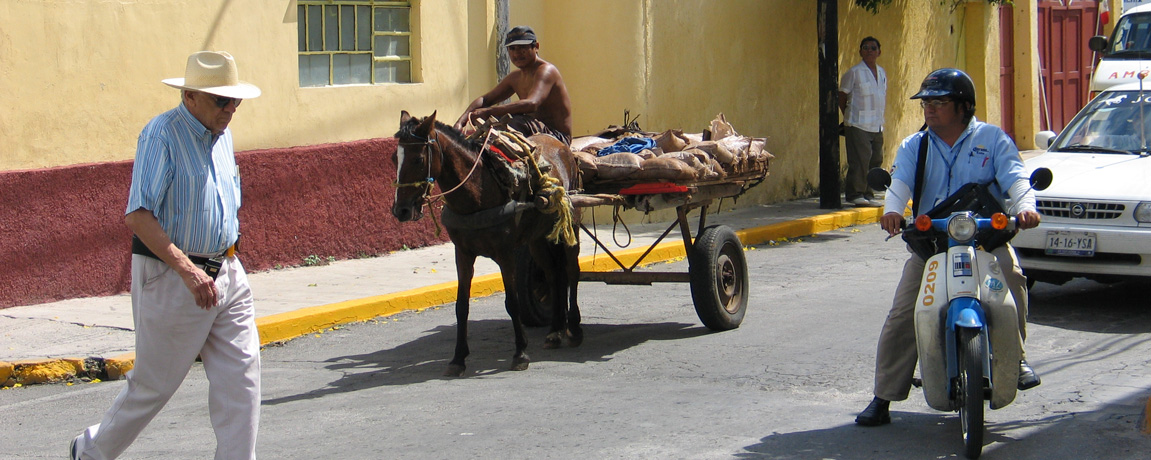


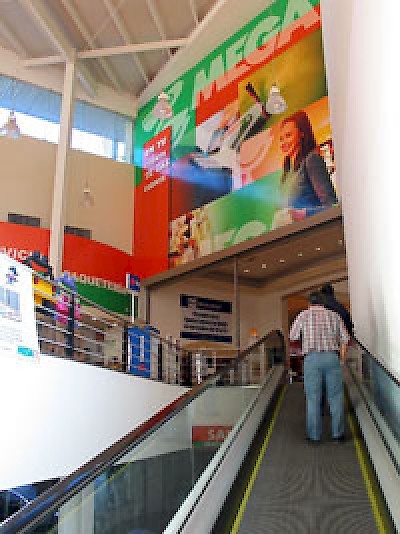
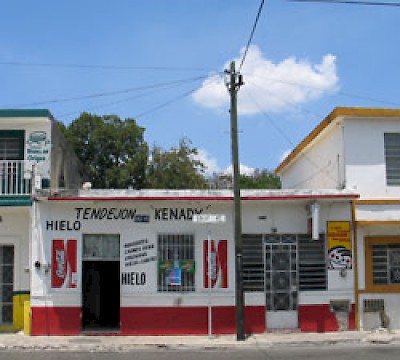
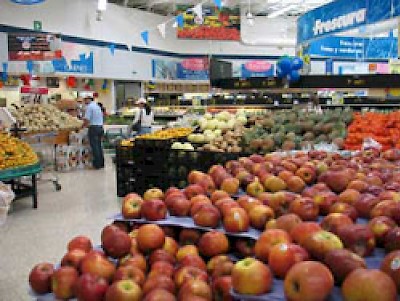
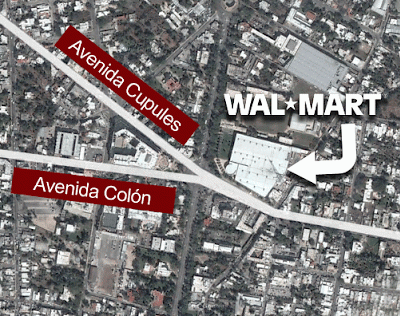
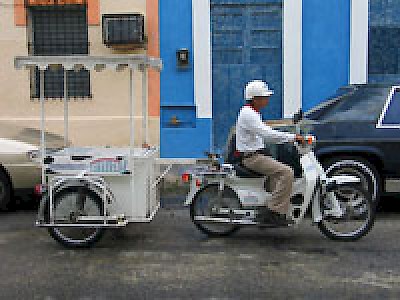

Comments
Working Gringos 18 years ago
You ask a great question... so we've added the info into the article (above). In case you miss WalMart, there is now a Bodega Aurrera (not sure if this is the right spelling) in Progreso, right at the corner where you turn right to go to Telchac Puerto. This is a Mexican chain that is owned by WalMart. It is geared more to the Mexican pallet (probably doesn't have as many US products) but would certainly have things like coffee, milk and other staples. You just might not find your particular brand of PopTarts there.
Reply
Kris 18 years ago
Hi,
Enjoyed all the info. We will be passing through Merida on the way to Telchec Puerto. (Our first time to visit this area) We were told that the best place to stock up on groceries for the week is the Walmart in Merida. Can you tell me what the address is and how late they are open.
Thank you so much,
Kris
Reply
Working Gringos 18 years ago
Here is something that came to us because we have mentioned that WalMart carried organic food now:
Wal-Mart Charged with Selling Nonorganic Food as Organic; Group Asks USDA to Fully Investigate Organic Product Misrepresentation
CORNUCOPIA, Wisconsin - November 14 - The Cornucopia Institute, the nation's most aggressive organic farming watchdog, has filed a formal legal complaint with the USDA asking them to investigate allegations of illegal "organic" food distribution by Wal-Mart Stores, Inc. Cornucopia has documented cases of nonorganic food products being sold as organic in Wal-Mart's grocery departments.
"We first noticed that Wal-Mart was using in-store signage to misidentify conventional, nonorganic food as organic in their upscale-market test store in Plano, Texas," said Mark Kastel of The Cornucopia Institute. Subsequently, Cornucopia staff visited a number of other Wal-Mart stores in the Midwest and documented similar improprieties in both produce and dairy sections.
Cornucopia notified Wal-Mart's CEO Lee Scott in a letter on Sept. 13, 2006, alerting the company to the problem and asking that it address and correct the situation on an immediate basis. But the same product misrepresentations were again observed weeks later at separate Wal-Mart stores. Fines of up to $10,000 per violation for proven incidents of organic food misrepresentation are provided for in federal organic regulations.
Earlier this year, Wal-Mart announced a sweeping organic foods initiative and declared that they would greatly increase the number of organic offerings for sale in their stores — at dramatically lower prices than the competition. The move by the giant retailer has been under close scrutiny from members of the organic community.
"This is disturbing and a serious problem," Kastel said. "One can question whether Wal-Mart has the management and staff expertise necessary to fully understand organics and the marketing requirements essential to selling organic food. Given their size, market power, and market clout, this is very troubling."
A number of other organic food retailers throughout the country, including Whole Foods Markets and many of the nation's member-owned grocery cooperatives, have gone to the effort to become certified organic in terms of the handling of their products and have invested heavily in staff training.
This past September, The Cornucopia Institute also issued a white paper, "Wal-Mart Rolls Out Organic Products — Market Expansion or Market Delusion?" The report accuses Wal-Mart of cheapening the value of the organic label by sourcing products from industrial-scale factory-farms and Third World countries, such as China.
For the full news release and more on the Wal-Mart legal complaint and white paper, visit http://www.cornucopia.org
_____
If they aren't being honest about it in the US, chances are they aren't in Mexico either. I think we can still be sure of the organic milk and a few other things, but perhaps the organic apples and other fruits and veggies are a little suspect now.
Reply
Working Gringos 18 years ago
OK, OK!! We think it's time to write something about the cost of living here. So we will take on that task... but keep in mind that it's *very* subjective. We could easily eat here on $5 US a day and not go hungry. But we don't, because we like our wine from California, our Parmesan from Italy and our beef from Argentina, etc. So, we'll do our best. But please take it all with a grain of salt (or maybe, a pinch of salt, in the case of the beef from Argentina...) and understand that no matter how many assurances you get from other people, moving to another country is a risk... which is what makes it an adventure!
In general, most things in Mexico are cheaper. But some things aren't. And everything could change tomorrow (or rather, the day after you leave everything behind and move here). If you didn't learn it in the 60's, living in the Yucatan has a way of teaching you to "go with the flow".
Reply
Jay & Neny 18 years ago
Your web site is great and has given us a lot of information and answers to some of the questions we had about retiring in Mexico which is our plan. One question which is still unanswered is approximately how much would be the monthly expense for food for a couple?(cooking at home), we have been told that with about $1000 - 1500 US a month we could cover normal household expenses, is this true? We would appreciate if someone could answer these questions. We are planning to visit Mexico before year end to look at some properties or a lot to build our home since the area of Yucatan appeals to us. Thanks!
Reply
Working Gringos 18 years ago
Hola, Leticia!
It's so funny that you say that shopping in the US is a lonely task. As gringos, we sort of expect it to be that... but of course we have noticed that the local Yucatecans turn grocery shopping into a family affair. Dare I say, even into a party!
And about friendly people. When I moved to NYC in 1976, I was struck by how unfriendly people in NYC were compared to those from my hometown, Los Angeles. But the last few times I've gone home to California, I've noticed that people in California don't smile and say hello anymore either. Of course, living in Mexico, I have become very accustomed to this. It seems downright RUDE now to pass someone on the street without saying "Buenos dias" or "Buenas tardes" and smiling. But if you do that in California, you can just see their little brains saying to themselves, "Do I know her? Why is she bothering me?"
I'm sure you'll have a lovely time in Merida showing your husband around!
Reply
Leticia Martinez 18 years ago
I got a few laughs reading your article. I am Yucatecan and lived in California for 30 years. I truly miss the mercados of merida and the lifestyle of the city. Shopping in supermarkets in the US is a lonely task and most of the time a dreadful task we don't look forward to. I love fresh food and cook everyday as fresh as possible. My husband (an american) loves my cooking and he used to live on frozen foods and pollo loco, now when I don't feel like cooking, he would ask for at least a home made sandwich rather than going out to dinner. I cook half yucatecan, half mexican with the american ingredients. Find the calabacita frita con pork, delicious. My husband and I will be visiting in October. I will be showing off my hometown! I commute 110 miles each day, spend 2 gas tanks a week, hate the traffic, love my air conditioner, love the dry weather, Merida is too humid. However, I love Merida and I wish I could retire there! Yucatecans are very friendly and kind people. You don't find friendly people in California. If you smile and say good morning to a stranger they look at you funny! there must be something wrong with you!
Bomba!
Reply
Working Gringos 19 years ago
Hi Steve,
How much you spend on food depends on the kind of food you eat and the lifestyle you want. You can shop at the local mercados, spend less and eat like a local. Or you can go to any number of modern grocery stores and spend like a gringo. Or some combination of the two (our preferred method).
You can eat every meal at a local restaurant or a cocina economica and still not spend more than $12 a day. Or you can go whole hog at a tourist or upscale restaurant and spend well over $120 for dinner.
If you go the less expensive route, you will still be eating well. The food at cocina economicas is healthy, home made and fresh. Lunch at the cocina economica around the corner costs $25 pesos (a little more than $2 USD) and is often more than we can eat. For an extra $6 pesos, you can get a horchata or an ice cold Coca Cola. At the corner tendejon, Salvador's wife makes great panuchos. They are $3 pesos each. Three of those with a little habanero sauce on top is a great lunch... or Yucatecan breakfast. Tacos at Wayan'e are $7 pesos each. Four of those are our usual lunch.
A meal at Burger King is over $50 pesos. And it doesn't taste good! That's why we never eat at those places anymore.
You get the idea.
The nice thing about Merida is that you have a lot of choices. Hope this helps!
Reply
steve 19 years ago
Love your articles.
One question which would help me:
Can you tell me what I might spend on average
for buying food each month ?
Thanks
Reply
Working Gringos 19 years ago
Joe: Maybe next time we should soak our articles in Microdyne to remove the nits and grits.
William: We just thought "have be" was a Yucatanism for the Mayan "ha beh", which could be "loosely" translated as watery trail...
On a completely similar subject, when we were driving around the Yucatan outback, we ran into a Mayan pueblito called Poop. Ever heard of it?
A link to NotTheNews by El Maloso has been our honor to add to the link list. Now who the heck is William Lawson?
Reply
William Lawson 19 years ago
Did I just write have be? hmmm...
Reply
« Back (140 to 151 comments)Next »